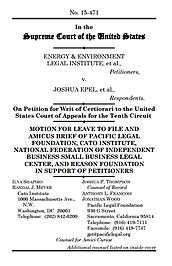Energy & Env’t Legal Inst. v. Epel
Learn more about Cato’s Amicus Briefs Program.
The Commerce Clause, while invoked since the New Deal as a warrant for progressive federal policy, actually provides protections for businesses against state regulations that burden interstate commerce. In Brown-Forman Distillers Corp. v. New York State Liquor Authority (1986), for example, the Supreme Court struck down New York’s Alcoholic Beverage Control Law on the ground that it regulated the price of alcohol outside the state. Or take this hypothetical example: Colorado gets its electricity from a grid that services 11 states, Canada, and Mexico. Electricity used anywhere within this grid can come from any source that services it and, once loaded onto the grid, this electricity is identical, regardless of how it was produced or the fuel used to generate it. Yet Colorado renewable-energy regulations require that all energy that enters the state be created in compliance with certain parochial standards, which excludes the type of power generated by a particular power company in California. What Colorado has effectively enacted is an extraterritorial law, regulating economic activity outside the state and thus violating the Commerce Clause (more technically, the Dormant Commerce Clause, in the sense that Congress hasn’t explicitly legislated to prohibit the Colorado regulation). This situation is not hypothetical, however, but the actual case of Energy & Environment Legal Institute v. Epel, wherein the U.S. Court of Appeals for the Tenth Circuit held that Colorado’s regime evaded Commerce Clause scrutiny because it did not consist of pure price controls. No matter that the regulations has a clear anticompetitive and protectionist effect on the interstate energy market—favoring in-state (complying) producers over out-of-state ones—the court sanctioned any state’s adoption of extraterritorial regulation so long as the state is savvy enough to crafts its rules as something other than a price-control mechanism. Accordingly, Cato has joined the Pacific Legal Foundation, National Federation of Independent Business, and Reason Foundation on an amicus brief supporting a request that the Supreme Court take the case and restore a (relatively) free and competitive interstate energy market. This brief comes at an important crossroads for state-federal economic regulation, particularly relating to environmental norms. Indeed, California’s attempt to regulate out-of-state emissions was raised before the Court in Rocky Mountain Farmers Union v. Corey (2014) —turnabout is fair play? — and North Dakota is suing Minnesota for attempting to regulate its neighbors’ emissions. The ban on extraterritorial regulation vis-à-vis the Commerce Clause is essential to preserving the competitive-federalism regime enshrined in the Constitution and the Supreme Court’s precedents. If states were able to impose their regulatory schemes on out-of-state companies in interstate industries, the 50 “laboratories of democracy” would not be able to function as such. Under a regime of federal rivalry, competition for voters, taxpayers, and industries forces states to be accountable to those they govern and innovative in their search for solutions to vexing problems. If a state finds a cheaper, more efficient way to solve a policy conundrum, people and businesses will flock to it. But if states can impose the costs of their regulatory regimes on their neighbors, they could blunt this competitive effect. The Supreme Court should take up Epel and flesh out federal constitutional protections for interstate commerce.
